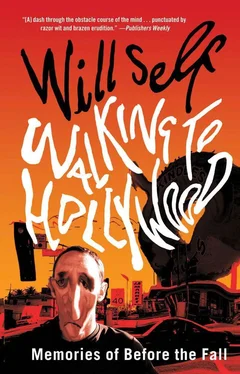Will Self - Walking to Hollywood
Здесь есть возможность читать онлайн «Will Self - Walking to Hollywood» весь текст электронной книги совершенно бесплатно (целиком полную версию без сокращений). В некоторых случаях можно слушать аудио, скачать через торрент в формате fb2 и присутствует краткое содержание. Год выпуска: 2011, Издательство: Grove/Atlantic, Inc., Жанр: Современная проза, на английском языке. Описание произведения, (предисловие) а так же отзывы посетителей доступны на портале библиотеки ЛибКат.
- Название:Walking to Hollywood
- Автор:
- Издательство:Grove/Atlantic, Inc.
- Жанр:
- Год:2011
- ISBN:нет данных
- Рейтинг книги:4 / 5. Голосов: 1
-
Избранное:Добавить в избранное
- Отзывы:
-
Ваша оценка:
- 80
- 1
- 2
- 3
- 4
- 5
Walking to Hollywood: краткое содержание, описание и аннотация
Предлагаем к чтению аннотацию, описание, краткое содержание или предисловие (зависит от того, что написал сам автор книги «Walking to Hollywood»). Если вы не нашли необходимую информацию о книге — напишите в комментариях, мы постараемся отыскать её.
Walking to Hollywood — читать онлайн бесплатно полную книгу (весь текст) целиком
Ниже представлен текст книги, разбитый по страницам. Система сохранения места последней прочитанной страницы, позволяет с удобством читать онлайн бесплатно книгу «Walking to Hollywood», без необходимости каждый раз заново искать на чём Вы остановились. Поставьте закладку, и сможете в любой момент перейти на страницу, на которой закончили чтение.
Интервал:
Закладка:
There was a raw constructivism to the Nationwide title sequence — and a peculiar masculinity also. There were no women nationwide — at least, not in this erect procession of images, whose subtext was a series of phallicisms: Progress, the well-lubricated interpenetration of Town and Country, Benign Paternalism. I loved Nationwide ; my brother and I would watch it whenever we could — which wasn’t often, because our insufferably bien-pensant parents had, in their infinite snobbery, got rid of our television. Usually, the current affairs the show reported were emphatically soft and mushy: items about skateboarding ducks, or a monastic order that manufactured toothbrushes; hard news resounded elsewhere. It was presumably in this spirit of quirky human interest that the man at Skipsea Sands on the Holderness coast had been interviewed.
Middle age — the fulcrum around which the mind-world turns. In youth the future is murky, while the past has a seeming clarity — but now it’s the future that becomes crystal clear: blackberries shining in a hawthorn hedge after sudden autumnal rain. Decline — then death. Meanwhile the past recedes, lapping back from a muddied shore across which it’s unsafe to wade — who knows what might have happened there?
At New Year there had been a photograph in the newspaper headed ‘Hazardous New Year’ and captioned ‘Houses close to a cliff in Skipsea, Yorkshire, have been gradually falling over the edge and it is thought unlikely that they will survive the year.’ They? Survive? Echoes surely of the personification of property that had dominated Britain in the early years of the century, but, setting this to one side, there remained the uncanny feeling that while the householders had been watching for years as the void encroached on their loved ones — undercutting the gardens, munching on the rockeries, crunching up the cucumber frames, then picking its teeth with raspberry canes — I had been watching them watch.

I conceived of taking a walk from Flamborough Head, north of Bridlington, where the chalk synclines of the Yorkshire Wolds are sheered off by the brown sea, to Spurn Head, that peculiar three-mile shingle bracket that hooks round into the wide mouth of the River Humber. It occurred to me that were I to keep for the entire distance within six feet of either cliff edge or shoreline, I would, very likely, have completed a journey it would be impossible for anyone to ever make again. By the time another year had passed the solid ground that had risen up to meet my feet would have disappeared forever.
This would be a unique walk of erasure — a forty-mile extended metaphor for my own embattled persona, as its foundations were washed away by what I suspected was earlyonset Alzheimer’s. Perhaps it was also sympathetic magic: the walk devised as a ritualized erection of groynes, which might impede the longshore drift of my psyche.
To counter this — frankly morbid — self-absorption, I scanned the data on long-, short- and medium-term cliff erosion rates. I checked out coastal evolution and beach plan shape modelling. I examined the evidence of site inspections, and the various proposals — including the Mappleton coastal defences — that had been advanced against the ceding of solid to liquid. I read the reports of expert witnesses, and looked at the aerial photographs they had posted on the web, marked up so as to make explicit the underlying dynamics.
The names of the towns and villages that had been inundated since the medieval era were legion: Wilsthorpe, Hartburn, Hyde, Withow and Cleton; Hornsea Burton, Hornsea Beck and Southorpe; Great Golden, Golden Parva and Old Aldborough — and so on; like mortality itself, the sea had ground into utter oblivion, these, the habitations of already faceless villeins. Near to Spurn Head itself had stood the substantial town of Ravenser, a sturdy plantation of spires and spars where Henry Bolingbroke landed in 1399, and which, until the rise of Hull, was the principal port of Yorkshire. Since the Roman occupation more than fifty square miles of land had gone from Holderness, and still it disintegrated, clods and stones plash-plopping into the shallow sea.
As I undertook these researches the conviction grew in me that far from the erosion of two yards of land every year being a tragedy, it should be regarded as uplifting — for here was a landscape that was more transient than an individual human. The bungalows would be rebuilt inland, the UPVC windows reinstalled, the caravans would head north to Filey — only the earth was drowning.
I had never visited the Holderness coast, although, on a couple of occasions, I’d gone up to Hull to do book readings. The first time I went the crowd at the bar where I read seemed convivial, and afterwards I fell into conversation with a local man, talk that — I now realize — had itself been rendered parenthetical by the great bracketing of nearby Spurn Head. (He was a tall British-Asian with angular, faceted looks that mirrored my own — including the sunken cheeks, pockmarked with old acne scars.)
The man explained how he and his son liked to drive out on a Sunday, through the lush reclaimed lowland of Sunk Island to the peninsula, and how the sense of abandonment and loss they both felt — the family was broken, they were deracinated — was almost pleasurably compounded by Spurn Head itself, where on the eastern flank of the peninsula a Victorian lighthouse stood, surrounded at high tide by the waters of the estuary, for the shingle and sand spit where it had once rested had wavered away to the west.
On their walks along the beaches, the man and his son happened upon slimed reefs of discarded chattels — fridges, televisions, washing machines, the dinosaur bones of antediluvian agricultural equipment — all of it caught in serried piles, which in previous centuries had been driven into this skittish land in a forlorn attempt to pin it down . And as I listened to the man talk — he was not articulate, but expressive, what with his shrugs and hand-chops and hesitations — I was thrust back to the Paragon Station at which I had arrived a couple of hours previously.
It was a proper terminus — emphatically at the end of the line. As I had lurched stiffly from the train, I was struck by how lofty the vaulted roof seemed; tiny humans beetled along the grey platforms beside the worms’ casts of the rolling stock, while from up on high cold loads of light were let down through translucent perspex. By the time I had reached the booking hall the fugue had intensified: the old oaken island of a branch of W. H. Smith’s and the blind arches along the walls faced with caramel-brown tiling shored up the mounting sensation that I had arrived too late; that this was the voided — although not yet decaying — outpost of an empire that, rather than being overthrown, had been undermined by creeping indifference.
That was the first visit. The second time I went to Hull I was early for my event and so walked through the shopping zone to visit the museum down by the old dock area, passing a pub that advertised Lindisfarne Fruit Wines and mixed drinks with names such as ‘Dr Pepper’s Depth Charge’ and ‘Shit-on-the-Grass’. In the cobbled streets of the eighteenth-century town the silence was louder than bombs.
It was a quiet weekday afternoon in summer, and almost museum closing time. Once I’d passed the somnolent staff in the shop full of moulded plastic and printed cotton, I found myself alone in a series of comfortingly predictable spaces. Polystyrene rocks housed dioramas of the Holderness coast of 120,000 years previously, when elephants wandered the jungly cliff that ran miles to the west of the present-day coastline. Then came a dummy of a Holocene mammoth, standing foursquare on the linoleum tiles; then there were Neolithic artefacts and a life-sized, mop-topped human dummy that had been buried in a fibreglass sarcophagus.
Читать дальшеИнтервал:
Закладка:
Похожие книги на «Walking to Hollywood»
Представляем Вашему вниманию похожие книги на «Walking to Hollywood» списком для выбора. Мы отобрали схожую по названию и смыслу литературу в надежде предоставить читателям больше вариантов отыскать новые, интересные, ещё непрочитанные произведения.
Обсуждение, отзывы о книге «Walking to Hollywood» и просто собственные мнения читателей. Оставьте ваши комментарии, напишите, что Вы думаете о произведении, его смысле или главных героях. Укажите что конкретно понравилось, а что нет, и почему Вы так считаете.












